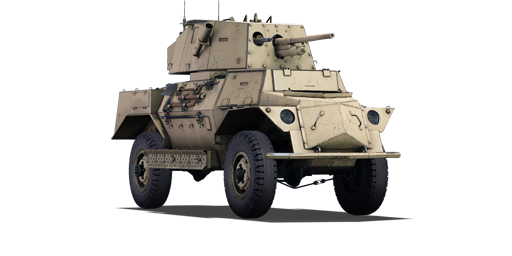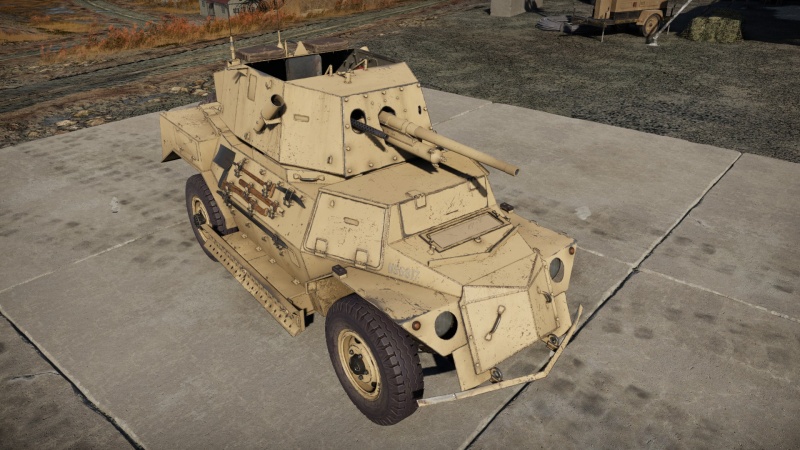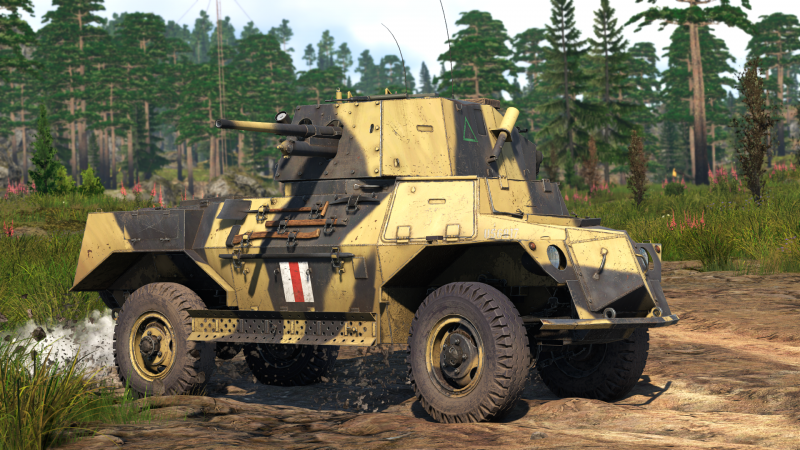SARC MkIVa
| This page is about the British light tank SARC MkIVa. For other versions, see Marmon-Herrington Armoured Car (Family). |
Contents
Description
The SARC MkIVa is a rank I British light tank with a battle rating of 1.3 (AB/RB/SB). It was introduced in Update "La Royale".
General info
Survivability and armour
The SARC MkIVa has poor survivability, with the 12 mm rounds able to penetrate the sides and 20 mm rounds the front. The crew is very tightly packed, meaning that any shot that hits one crew member it likely to knock out at least two. The SARC being open-topped leaves it highly vulnerable to even low calibre HE and aircraft bullets.
The SARC MkIVa's manoeuvrability and good reverse gear should be used to avoid getting hit and ambush the enemy. Vehicles with 20 mm autocannons and enemy SPAAs are very dangerous for the SARC, as they can easily shred its armour.
Armour type:
| Armour | Front (Slope angle) | Sides | Rear | Roof |
|---|---|---|---|---|
| Hull | ___ mm | ___ mm Top ___ mm Bottom |
___ mm | ___ - ___ mm |
| Turret | ___ - ___ mm Turret front ___ mm Gun mantlet |
___ - ___ mm | ___ - ___ mm | ___ - ___ mm |
| Cupola | ___ mm | ___ mm | ___ mm | ___ mm |
Notes:
Mobility
The MkIVa does not accelerate quickly. In a city fight or in a sniping match, this is a liability.
This is offset by its very high top speed of 80 km/h. This grants it unmatched speed on flat terrain. Combined with its smaller size, this gives the MkIVa the opportunity to sneak into a hidden location and get flanking shots on unsuspecting enemies.
| Game Mode | Max Speed (km/h) | Weight (tons) | Engine power (horsepower) | Power-to-weight ratio (hp/ton) | |||
|---|---|---|---|---|---|---|---|
| Forward | Reverse | Stock | Upgraded | Stock | Upgraded | ||
| Arcade | 94 | 15 | 6.3 | 147 | 181 | 23.33 | 28.73 |
| Realistic | 85 | 14 | 84 | 95 | 13.33 | 15.08 | |
Modifications and economy
The MKIVa depends on mobility. Due to the relatively low chance that the crew will survive getting shot, crew replacement is not an immediate priority. Instead, focus first on spare parts and FPE, then better ammunition, then mobility improvements. The strength of the MKIVa is its speed, so upgrades that facilitate that are important. Ignore brakes for last: you shouldn't need to stop better, you need to get to a hiding spot faster.
Armaments
Main armament
The QF 2-Pounder is a solid weapon for its tier. It can frontally penetrate most vehicles at its BR, but excels in flanking shots. The stock Shot MK. 1 AP shell has poor performance, so take effort to phase this out in favour of the better performing Shot MK IX APCBC.
The slow rotation speed of the turret means that the gun should ideally used in an ambush role on the sides of enemy tanks. The relatively high fire rate also allows for consistent fires on enemy targets.
Be advised that the QF 2-pounder loses accuracy over 500 meters, so it is ill advised to use the gun for this purpose: leave the sniping for the tank destroyers and concentrate on ambushing.
| 40 mm QF 2-pounder | Turret rotation speed (°/s) | Reloading rate (seconds) | |||||||||||
|---|---|---|---|---|---|---|---|---|---|---|---|---|---|
| Mode | Capacity | Vertical | Horizontal | Stabilizer | Stock | Upgraded | Full | Expert | Aced | Stock | Full | Expert | Aced |
| Arcade | 37 | -5°/+20° | ±180° | - | 15.6 | 21.6 | 26.2 | 29.0 | 30.9 | 3.64 | 3.22 | 2.97 | 2.80 |
| Realistic | 9.8 | 11.5 | 13.9 | 15.4 | 16.4 | ||||||||
Ammunition
| Penetration statistics | |||||||
|---|---|---|---|---|---|---|---|
| Ammunition | Type of warhead |
Penetration @ 0° Angle of Attack (mm) | |||||
| 10 m | 100 m | 500 m | 1,000 m | 1,500 m | 2,000 m | ||
| Shot Mk.1 AP/T | AP | 72 | 68 | 52 | 37 | 27 | 19 |
| Shot Mk.IXB APCBC/T | APCBC | 89 | 86 | 77 | 66 | 57 | 50 |
| Shot Mk.1 APHV/T | AP | 80 | 75 | 58 | 41 | 30 | 21 |
| Shell Mk.1 AP/T | APHE | 66 | 62 | 49 | 36 | 26 | 20 |
| Shell details | ||||||||||||
|---|---|---|---|---|---|---|---|---|---|---|---|---|
| Ammunition | Type of warhead |
Velocity (m/s) |
Projectile mass (kg) |
Fuse delay (m) |
Fuse sensitivity (mm) |
Explosive mass (TNT equivalent) (g) |
Ricochet | |||||
| 0% | 50% | 100% | ||||||||||
| Shot Mk.1 AP/T | AP | 792 | 1.08 | - | - | - | 47° | 60° | 65° | |||
| Shot Mk.IXB APCBC/T | APCBC | 792 | 1.24 | - | - | - | 48° | 63° | 71° | |||
| Shot Mk.1 APHV/T | AP | 853 | 1.08 | - | - | - | 47° | 60° | 65° | |||
| Shell Mk.1 AP/T | APHE | 792 | 1.08 | 1.2 | 9 | 20.9 | 47° | 60° | 65° | |||
Ammo racks
| Full ammo |
1st rack empty |
2nd rack empty |
3rd rack empty |
Visual discrepancy |
|---|---|---|---|---|
| 37 | 33 (+4) | 28 (+9) | 1 (+36) | __ |
Machine guns
| 7.62 mm M1919A4 | ||||
|---|---|---|---|---|
| Mount | Capacity (Belt) | Fire rate | Vertical | Horizontal |
| Coaxial | 1,000 (250) | 500 | N/A | N/A |
The M1919A4 is a good machine gun, though it is only useful for knocking out lightly-armoured vehicles like trucks or the occasional half-tracks. The high ammo count per belt means that sustained fire can be used to check bushes and smoke for obscured targets.
In an emergency, it can be used as an anti-aircraft weapon, but the poor damage output and turret rotation speed makes this option less advisable.
Usage in battles
Describe the tactics of playing in the vehicle, the features of using vehicles in the team and advice on tactics. Refrain from creating a "guide" - do not impose a single point of view but instead give the reader food for thought. Describe the most dangerous enemies and give recommendations on fighting them. If necessary, note the specifics of the game in different modes (AB, RB, SB).
Pros and cons
Pros:
- Very small profile; difficult to hit at range
- Small ammo rack size
- High straight-line top speed on paved surfaces
- Quick reload speed
- Fast acceleration; top speed can be reached fairly quickly
Cons:
- Can be easily penetrated by rifle-calibre rounds
- Low survivability with only three crew members
- Off-road mobility is lacklustre
- Difficult to control at high speeds
- Slow turret rotation and gun elevation
- Below-average gun depression
History
The South African Reconnaissance Car (SARC), known in British service as the Marmon-Herrington[1], had a remarkably diverse pedigree, as it combined components made in the United States, Canada, and the United Kingdom, put together in South Africa. The service record of its variants was similarly far-flung, despite its relatively small production numbers, as it saw service in WW2, Cyprus, across Africa, and even (from captured Japanese stock) Indonesia.[2]
This variant, the Mark IV, fitted a 40 mm 2-pdr. gun in an artillery mounting, not the usual tank-style mantlet. It arrived rather late in WW2, but saw action post-war in Cyprus and with the Arab League. Earlier versions fought with the 1st King’s Dragoon Guards at the Siege of Tobruk in 1941.[2]
Media
- Skins
See also
Links to the articles on the War Thunder Wiki that you think will be useful for the reader, for example:
- reference to the series of the vehicles;
- links to approximate analogues of other nations and research trees.
External links
https://youtu.be/MQmaXWPouno?si=LlsMop_td9gTYYDD
| Britain light tanks | |
|---|---|
| A13 | A13 Mk I · A13 Mk I (3rd R.T.R.) · A13 Mk II · A13 Mk II 1939 |
| A15 | Crusader II · Crusader "The Saint" · Crusader III |
| A17 | Tetrarch I |
| IFV | Warrior · Desert Warrior (Kuwait) |
| Wheeled | Daimler Mk II · AEC Mk II · Fox · Vickers Mk.11 |
| Other | VFM5 |
| South Africa | |
| SARC | SARC MkIVa · SARC MkVI (2pdr) · SARC MkVI (6pdr) |
| Ratel | Ratel 90 · Ratel 20 |
| Rooikat | Rooikat Mk.1D · Rooikat 105 · Rooikat MTTD |
| Other | Concept 3 · Eland 90 Mk.7 |
| USA | Stuart I · Stuart III |






